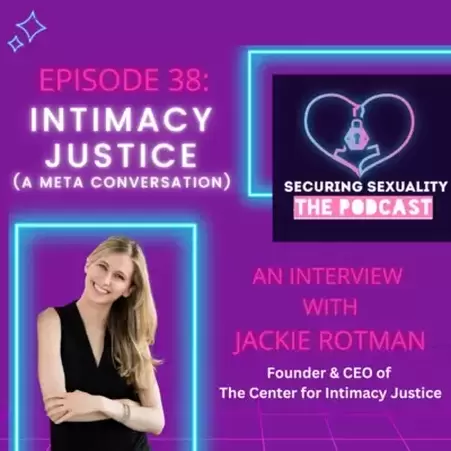Intimacy Justice (A Meta Conversation) with Jackie Rotman - Securing Sexuality Podcast Episode 386/11/2023
Securing Sexuality is the podcast and conference promoting sex positive, science based, and secure interpersonal relationships. We give people tips for safer sex in a digital age. We help sextech innovators and toy designers produce safer products. And we educate mental health and medical professionals on these topics so they can better advise their clients. Securing Sexuality provides sex therapists with continuing education (CEs) for AASECT, SSTAR, and SASH around cyber sexuality and social media, and more. Links from this week’s episode: Intimate Justice and Pleasure Equity: Addressing Power Imbalances in Sexual WellnessIn the era of digital communication, social media platforms have emerged as vital sources of information and resources. Yet, these platforms have also systematically impeded access to information on women's sexual health, an issue that demands urgent attention. In shedding light on this concern, we interviewed Jackie Rotman, the Center for Intimacy Justice (CIJ)'s CEO and founder, who is dedicated to confronting and rectifying discriminatory practices against women and people of diverse genders in sexual health. Jackie shared her thoughts on the impediments to accessing women's sexual health information on social media platforms, the subsequent impact on these populations, and the role of CIJ in addressing these barriers. Impediments to Accessing Women's Sexual Health Information During our conversation, Jackie highlighted several barriers to accessing information about women's sexual health on social media platforms. First, she noted the absence of accurate, updated, and evidence-based information about women's sexual health, which creates difficulty for individuals seeking to make informed decisions about their health. Jackie also underscored the systematic censorship by social media platforms of information on women's sexual health, particularly contraception and abortion. These subjects, often seen as contentious, can provoke a backlash from certain groups, resulting in censorship and withholding crucial health information. Lastly, Jackie pointed out the often stigmatizing language used to discuss women's sexual health on these platforms, fostering a culture of silence around these issues and hindering individuals from seeking help and support. Impact of Information Censorship on Women and Diverse Genders The systematic censorship of women's sexual health information has grave repercussions, especially for young women and individuals of diverse genders. These groups are most susceptible to misinformation and often lack access to necessary resources. Jackie said misinformation can lead to unintended pregnancies, STIs, and other health issues. It can also contribute to mental health challenges, as individuals may feel stigmatized or embarrassed about seeking help or support. The absence of accurate, reliable information can perpetuate harmful myths and stereotypes, leading to guilt and shame for individuals needing these services. How Does the Center for Intimacy Justice Address This Issue? The Center for Intimacy Justice is uniquely positioned to address the systematic censorship of women's sexual health information on social media platforms. Jackie underscored CIJ's mission to rewrite business policies to end discrimination toward sexual health for women and people of diverse genders, which involves revealing previously unseen issues, advocating for pioneering social changes, and creating sustainable solutions through interdisciplinary lenses, including economic, legal, policy, and human rights perspectives. The collaboration of social media companies, healthcare providers, and advocacy groups like the Center for Intimacy Justice is essential in this endeavor. Social media companies must acknowledge the importance of providing accurate, reliable information about women's sexual health and take measures to prevent censorship. Healthcare providers can play a proactive role by providing information and resources to young women and individuals of diverse genders, potentially through school-based sex education programs or universally accessible online resources. Advocacy groups such as CIJ are instrumental in raising awareness and advocating for change. Together, these groups can foster a culture that values and supports sexual health for all. Acknowledging Barriers, Understanding Impact, and Encouraging Collaboration The systematic obstruction of women's sexual health information on social media platforms is a pressing issue. By acknowledging the barriers to information access, understanding the impact of this issue on affected individuals, and encouraging collaboration to address it, we can strive for a world where all individuals have access to the sexual health information and resources they need to lead healthy and fulfilling lives. Key Concepts:
Stefani Goerlich: Hello and welcome to securing sexuality. The podcast where we discuss the intersection of intimacy-
Wolf Goerlich: -and information security. I'm Wolf Goerlich. Stefani: He's a hacker. And I'm Stefani Goerlich. Wolf: She's a sex therapist. And together, we're going to discuss what safe sex looks like in a digital age. And today we're chatting with Jackie Rotman, founder and CEO of the Center for Intimacy Justice, which recently released its research last year on the ways in which Meta has systematically blocked information about women's health. Uh, but today we're here to talk with her about their advocacy work and all the ways that they're improving this for us all. So, Jackie, thanks so much for joining us. Jackie Rotman: Thanks for having me. I love your duo for this podcast. More coming soon...Comments are closed.
|









 RSS Feed
RSS Feed